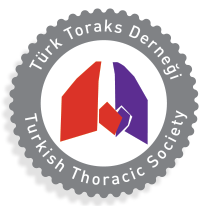Objectives: Recently, less invasive bronchoscopic methods such as bronchoscopic volume reduction coil treatment are preferred to surgery for the treatment of emphysema. The aim of the investigation is to find the efficacy and safety of bronchoscopic volume reduction coil treatment for the treatment of severe emphysema
Methods: Patients were GOLD 3-4 class and had homogeneous or heterogenous emphysema in HRCT. Patients were followed up 3rd, 6th, 12th months with mMRC dyspnea score, SGRQ quality of life scale, 6-MVT and RV measurements, and the results compared with using the Wilcoxon test.
Results: 16 patients were 13 (%81) male, 3 (%19) female patients. Adverse reactions were frequently COPD acute attack, pneumonia and one of the patients had pneumothorax. Patients mean of preoperative mMRC clinic dyspnea score was 3.38, 3rd months’ mMRC score mean was 2.62 (p=0.007), 6th months’ mean of mMRC 2.37(p=0.003) and 12th months mean of mMRC was 2.37(p=0.003). Preoperative SGRQ quality of life parameter was 71.95±15.7, 3rd month 66.7±16.2 (p=0.007), 6th month 62.4±15.5 (p=0.001) and 12th month was 62.9±16.4 (p=0.003). Preoperative mean of 6-MWT was respectively 247.25±112.36 meter, 3rd month 264.25±95 (p=0.148), 6th month 309±116.9 (p=0.026) and 12th month 317±122.9 (p=0.034). Patients’ preoperative RV was calculated as 5.28±1.96 L, 3rd month RV 4.52±1.35 (p=0.023), 6th month RV 4.55±1.25 (p=0.99) and 12th month RV 4.545±1.83 (p=0.163). Patients’ preoperative FEV1 respectively was 0.79±0.29 Lt., 3rd month 0.79±0.3(p=0.917), 6th month 0.91±0.30(p=0.063) and 12th month 0.86±0.3(p=0.756).
Conclusion: Bronchoscopic volume reduction coil treatment which is more efficient and safer treatment compared to surgery is predicted to be more widely used in the future in patients with advanced chronic obstructive pulmonary disease.



.png)
